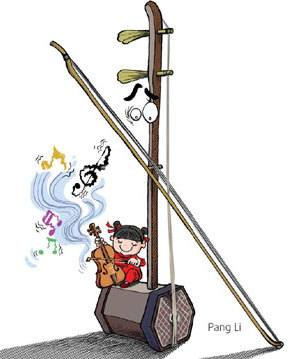By Stephen Moss
I am watching a six-piece Mongolian boyband dressed in gold lam suits playing folk tunes on traditional stringed instruments.
It is the first "serious music" I have experienced in China and it is on the hotel TV, airing on what I was assured was the classical music channel.
It gave me an early indication of the complexity of nailing just what the term "serious music" means in China. The Amadeus string quartet it is not.
Holed up for a week in a cheap hotel on the edge of the Forbidden City, close to Tiananmen Square, I am in Beijing to explore classical music in the Chinese capital and beyond.
I am also here to seek out China's indigenous traditions: the music of the villages, the opera derived from the imperial court, as well as the "model" operas about heroic peasants, written in the mid-1960s, and good enough to have survived beyond that grisly period. China has such a rich musical heritage of its own - why does it even need Beethoven and Brahms?
The mega dumpling of classical music in China is Yu Long, artistic director of the China Philharmonic and the Guangzhou Symphony, as well as founder of the Beijing Music Festival.
This confident, pinstriped, Shanghai-born grandson of a composer is both artist and bureaucrat, proudly proclaiming China's potential as a classical music powerhouse - even if, after graduating from the Shanghai Conservatory, he himself studied in Berlin and built a career in Europe.

"Everybody laughed when I came back to China," he tells me when we meet at the festival's smart Beijing offices. "Nobody believed China could be an important country for classical music. But I had an instinct."
It paid off: the festival is now in its 10th year, a glittering collision of Western artists and Chinese money. What is more, the China Phil has just signed a deal with Decca, all of which has made Yu the public face of Western classical music in China, along with the pianist Lang Lang and the composer Tan Dun.
Curtis Price, principal of the Royal Academy in London, even believes China will be the "salvation" of classical music, taking up the slack as its audience declines in the West.
Lorin Maazel - music director of the New York Phil, which I saw perform in Beijing for an outrageous $234 - agrees.
"I think the Chinese people, who have shown their passion and high sense of aesthetics, are an ideal spawning ground for burgeoning interest in classical music," he said while in the capital. "It could be that one of the most important defenders of classical music will be China."
Can this really be? Have I arrived to find China on the cusp of a golden age for classical music?
Such talk is disputed by music critic Liu Xuefeng. He argues that, in the 1980s, there was an upsurge of interest in Western classical music, but it has now waned. "Then, we had an audience but few musicians," he said. "Now, we have musicians but no audience."
Events such as the festival, he maintains, are built on shallow foundations: audiences enjoy big, romantic repertoire, gala events, Lang's emphatic style, but they are not being educated to appreciate music in the round.